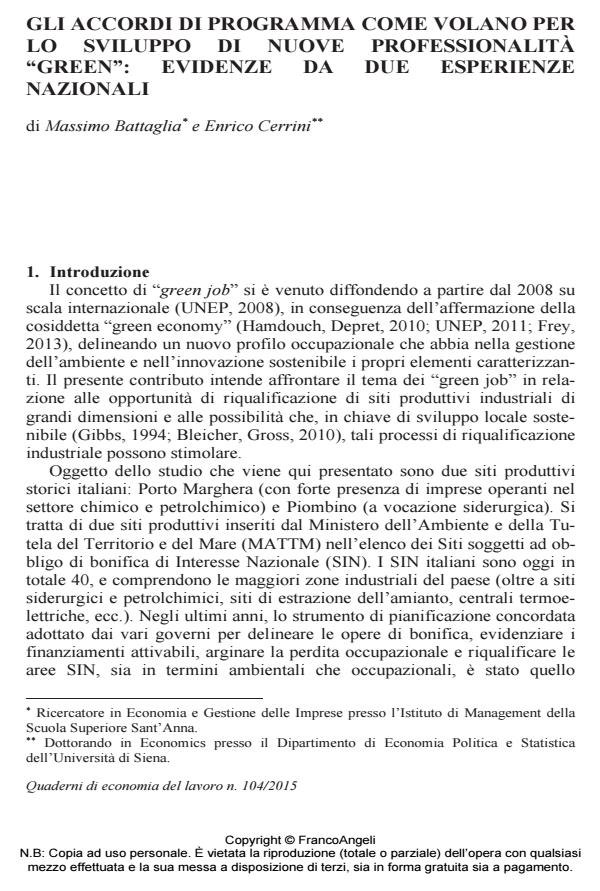Gli accordi di programma come volano per lo sviluppo di nuove professionalità "green": evidenze da due esperienze nazionali
Journal title QUADERNI DI ECONOMIA DEL LAVORO
Author/s Massimo Battaglia, Enrico Cerrini
Publishing Year 2016 Issue 2015/104
Language Italian Pages 20 P. 95-114 File size 74 KB
DOI 10.3280/QUA2015-104006
DOI is like a bar code for intellectual property: to have more infomation
click here
Below, you can see the article first page
If you want to buy this article in PDF format, you can do it, following the instructions to buy download credits

FrancoAngeli is member of Publishers International Linking Association, Inc (PILA), a not-for-profit association which run the CrossRef service enabling links to and from online scholarly content.
- Battaglia M. (2015). CSR and SMEs: relations with stakeholders and competitive performance. Aracne Editrice, Ariccia (RM).
- Bleicher A., Gross M. (2010). Sustainability assessment and the revitalization of contaminated sites: operationalizing sustainable development for local problems. International Journal of Sustainable Development & World Ecology, vol. 17, n. 1, pp. 57-66.
- Cato M.S. (2012). Green economics: putting the planet and politics back into economics. Cambridge Journal of Economics, vol. 36, n. 5, pp. 1033-1049.
- Chertow M. (2000). Industrial symbiosis: literature and taxonomy. Annual Review of Energy and the Environment, n. 25, pp. 313-337.
- Chertow M. (2007). Uncovering Industrial Symbiosis. Journal of Industrial Ecology, vol. 11, n. 1, pp. 11-30.
- Frey M. (2013). La Green Economy come nuovo modello di sviluppo. Impresa progetto – Electronic journal of management, n. 3, pp. 1-18.
- Gibbs D. (1994). Towards sustainable local economic development: the UK experience. International Journal of Sustainable Development & World Ecology, vol. 1, n. 2, pp. 121-129.
- Grbich C. (2007). Qualitative Data Analysis: An Introduction. Sage Publications, Los Angeles.
- Hamdouch A., Depret M.H. (2010). Policy integration strategy and the development of the ‘green economy’: foundations and implementation patterns. Journal of Environmental Planning and Management, vol. 53, pp. 4, pp. 473-490.
- Iraldo F., Testa F., Frey M. (2009). Is an environmental management system able to influence environmental and competitive performance? The case of the eco-management and audit scheme (EMAS) in the European Union. Journal of Cleaner Production, n. 17, pp. 1444-1452.
- IRPET (2013). Rapporto sul mercato del lavoro. A cura di Elena Cappellini e Nicola Sciclone. Firenze.
- McArthur Foundation (2015). Towards a Circular Economy: Business Rationale for an Accelerated Transition. November 2015.
- Nicodemi W. (1990). Siderurgia: processi ed impianti. Associazione Italiana Metallurgia.
- Pedersen E.R. (2007). Perceptions of performance: how European organizations experience EMAS registration. Corporate Social Responsibility and Environmental Management, vol. 14, n. 2, pp. 61-73.
- Richards L. (2005). Handling Qualitative Data: A Practical Guide. Sage Publications, London.
- Romanato M. (2003). La Memoria del Lavoro. Le carte del Consiglio di Fabbrica della Galileo Industrie Ottiche (1947-2000). Annale n. 4, Centro Studi Ettore Luccini, Padova.
- UNEP (2008). Green Jobs: Towards Decent Work in a Sustainable, Low-Carbon World. New York.
- UNEP (2011). Towards a green economy. New York.
Massimo Battaglia, Enrico Cerrini, Gli accordi di programma come volano per lo sviluppo di nuove professionalità "green": evidenze da due esperienze nazionali in "QUADERNI DI ECONOMIA DEL LAVORO" 104/2015, pp 95-114, DOI: 10.3280/QUA2015-104006